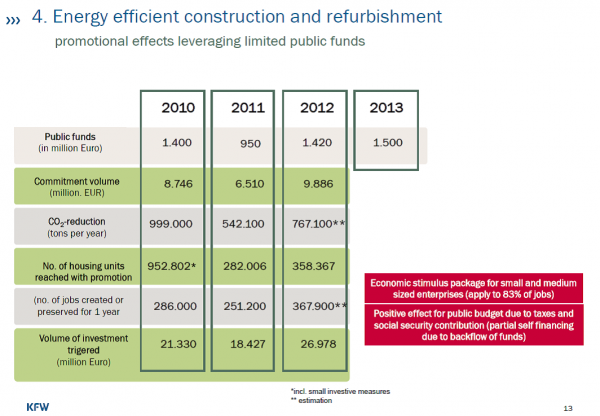Conclusions
Some conclusions (5)
First, the German ‘three-pillar’ approach of integrating energy efficiency provisions into a clear framework of regulation, information and support for renewables has served it well, creating a strong, enforceable legal standard to underpin change and generating a clear, consistent message about the direction and required radical nature of change. Second, KfW provides repayable loans on favourable terms, or performance-linked investment subsidies, rather than unconditional subsidies or tax concessions, as a more reliable and sustainable funding mechanism. Third, the German schemes provide qualified expert advice and installation so that appropriate work is carried out to a high standard. As a result, the promised energy gains and a positive customer experience have been achieved, and over time the German construction industry has acquired great expertise in this area. Fourth, German policy requires investments in energy efficiency to be made before subsidies for renewable energy are paid. This increases the proportionate contribution renewable energy can make to meeting overall demand, saves money, makes a bigger contribution to the wider goal of climate protection, and provides a more coherent overall message to the public about the need to reduce CO2 emissions.
Fifth, German policy assumes it is better to adopt a ‘whole house approach’ to energy saving, even if measures are adopted piecemeal, and high energy efficiency measures only implemented bit by bit as people work on different parts of their houses. This enables the overall ambition for energy efficiency improvement to become clear for energy suppliers and builders, while giving some assurance to government that the required emission reductions will be achieved. Sixth, policy aims to support experimentation and innovation, to build awareness and familiarity for new approaches to energy efficiency, and to identify successful approaches that can be taken to scale. Seventh, public buildings have an important role to play, to provide conspicuous examples to the public of what can be achieved by ambitious retrofit measures. This is particularly the case in schools, nurseries and children’s centres, where such measures can have important educational benefits as well. Ultimately, conserving attitudes and behaviour towards energy use, and awareness of the need to reduce greenhouse gas emissions, are going to be required if the necessary step changes in home energy efficiency are to be achieved. There has so far been widespread public support in Germany of the government’s energy saving and green initiatives. This is at least partly because of a perception in Germany that energy saving and climate policy can create energy security and economic benefits for the future.
reference
(5) http://sticerd.lse.ac.uk/dps/case/cp/KfWFullReport.pdf
